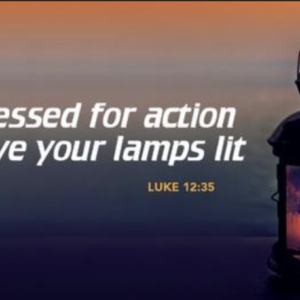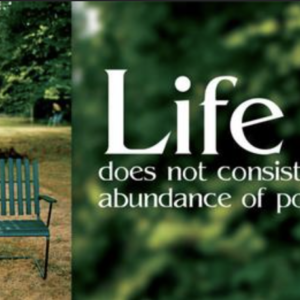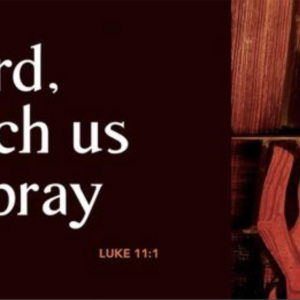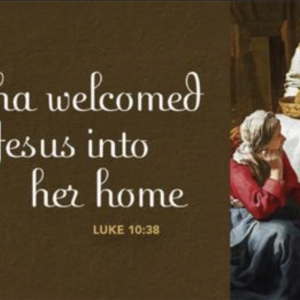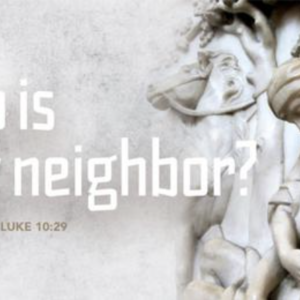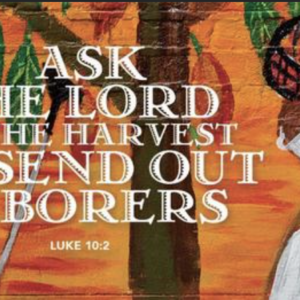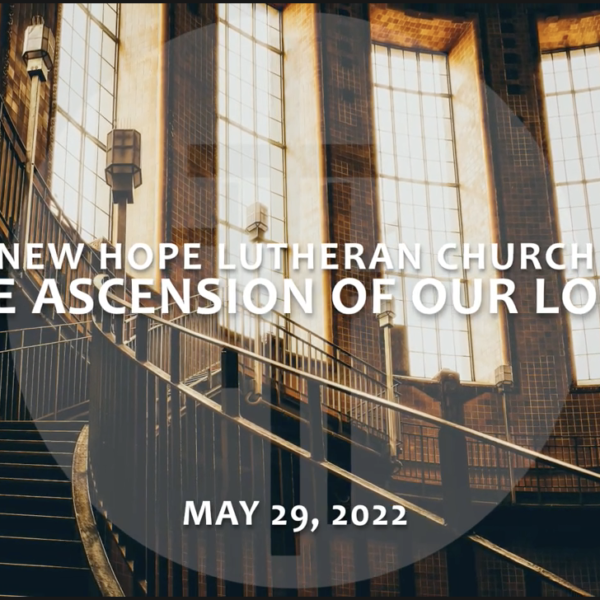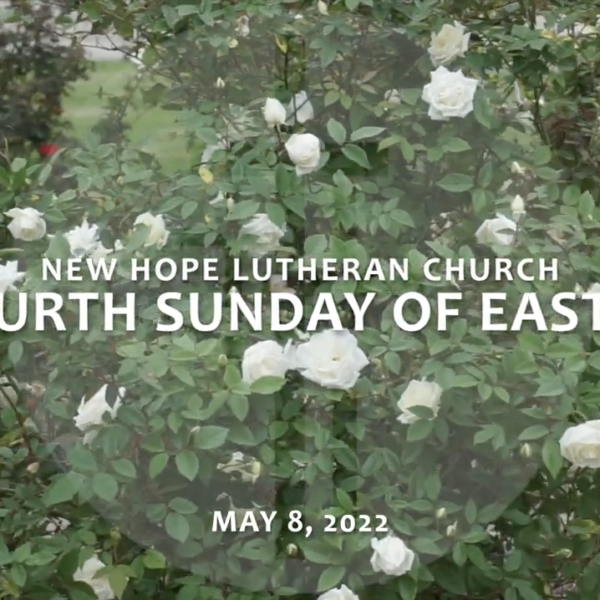Ninth Sunday After Pentecost
Luke 12:32-40
[Jesus said:] 32 “Do not be afraid, little flock, for it is God’s good pleasure to give you God’s kingdom. 33 Sell your possessions, and give alms. Make purses for yourselves that do not wear out, an unfailing treasure in heaven, where no thief comes near and no moth destroys. 34 For where your treasure is, there your heart will be also.
35 “Be dressed for action and have your lamps lit; 36 be like those who are waiting for the bridegroom to return from the wedding banquet, so that they may open the door for him as soon as he comes and knocks. 37 Blessed are those servants whom the master finds alert when he comes; truly I tell you, he will fasten his belt and have them sit down to eat, and he will come and serve them. 38 If the master comes during the middle of the night, or near dawn, and finds them so, blessed are those servants.
39 “But know this: if the owner of the house had known at what hour the thief was coming, the owners would not have let the house be broken into. 40 You also must be ready, for the Son of humanity is coming at an unexpected hour.”
————————
Please pray with me this morning, church:
Loving God,
You persist in lavishing us with good things.
Give us hearts that yearn after those
People for whom your own heart yearns.
Mold us into compassionate disciples
And give us courage to boldly live into our values.
Amen.
————————
A good friend and mentor, who is a pastor out in North Carolina, often tells the same story whenever he talks about stewardship. He tells the story of his grandmother who was meticulous in keeping her checkbook, showing my colleague all the entries and how much went to this person or organization and how much went to this thing or that thing. And the way he tells it, as she was doing this she said to him, “You can tell a lot about a person just by looking at their checkbook. If you want to know what or who a person values, look at their checkbook.”
If you want to know what someone’s values are, look at how they spend their money.
Our gospel reading from the Gospel of Luke this morning isn’t inherently a stewardship text, it seems like it’s more just like a collection of sayings attributed to Jesus that the gospel compilers didn’t know where else to put so they just kind of rammed them in here in the middle of chapter 12…but I do think these verses speak about values. And if my friend’s grandmother is correct, and I think she is, our values are necessarily linked to our stewardship.
What are your values, church? What do you say you’re passionate about? Who do you say you’re for? What causes and ideas will you put yourself and your reputation on the line for?
The verses this morning come after our reading from last week when we talked about the wealthy landowner who gave no thought to the poor and marginalized in his midst, and also after this lovely teaching from Jesus that we didn’t hear in worship about worry and how worrying doesn’t add life to your years or years to your life, and how much more valuable are you, dear child, than birds and lilies. Jesus continues this morning, “Don’t worry…and don’t be afraid, for it is God’s good pleasure to give you the treasures of God’s kingdom. And where your treasure is, there your heart will be also.”
We’ve talked about these good gifts that God gives to God’s people now for quite a few weeks. And today Jesus says that God delights in giving God’s people those good things, namely the treasures of God’s kingdom. And it’s interesting that Jesus is talking about the treasures of God’s kingdom, instead of saying that God will give you the treasures of your heart. But like we talked about with the Lord’s Prayer, like we talked about last week with storing up wealth and riches for yourself without a thought toward those in need, God is intent on bringing about God’s dominion, God’s kingdom, God’s reign of peace and love and justice and equity—not what our heart desires, but what God’s heart desires. Your dominion come, God, your will be done.
Because when we confuse God with a divine vending machine, we think that God will give us whatever we want or ask for, but God promises to give us the gifts of God’s kingdom, which isn’t necessarily our own heart’s desire. But…Jesus says…”Where your treasure is, there your heart will be also.” If God gives us the treasures of God’s kingdom, if we receive those gifts as treasures, our hearts will long after those treasures of God’s kingdom as well.
What are your values, church? What are those causes and ideas and people that your heart longs after? Are they the same things that God’s heart longs for? I wonder, how have your values changed over the years, over the past 2 and a half years of a pandemic, and as you’ve gotten older…?
We’re in a season of clarifying values here at New Hope, as well.
We value worship.
We value thoughtful, engaging, inspiring worship. We value worship that draws you closer to God and propels you to be close in proximity to your neighbor. We value making a joyful noise; whether it’s your lovely voices joined together in song, our extraordinary organ and musicians, our outstanding choir, and even the shrieks and laughter of our young people, the Psalmist tells us to make a joyful noise to praise God, and so we do.
It also means that we need you to do it. The fullness of our expression as a worshiping community that praises God depends on you and on your presence. It’s been a real gift of the pandemic that we can now worship wherever we are, that new people to our worshiping community can join us from across the United States, and that you can join us when you’re away from this place. It’s why I have you wave hi to our friends every single Sunday, because they, too, are part of this community. But we do recognize that it’s a mediated part. I hope that livestreaming doesn’t become a substitute for joining worship physically in-person. Because when you are here, present, and physically in this space, we are more reflective of the fullness and the beauty of our worshiping community. I long to see our friends who join us every week on our livestream, at such time as they are able to be here.
We value consequential faith.
We value asking questions, exploring together, in dialogue, in conversation. We believe that faith doesn’t stop developing at Confirmation. We believe that we are, all of us, on a lifelong journey of growing and being challenged and being changed in our faith. It’s why we try and offer so many options to grow and ask questions. From bible studies to book studies to Sunday School classes to retreats…just as important as worship, is a regular practice of growing in your faith. As we get ready to start a new program year, I deeply hope that you will find an education class on Sunday morning, that you would bring your kids and grandkids regularly, and that you would invite someone to join you. Pastor Janelle is doing a truly wonderful job at pulling everything together, but similar to worship, your presence is needed. Not just to attend, but to volunteer, to teach, to lend your voice, and to help shepherd and lead our young ones. We will give you everything you need, but if you feel called to help our youngest members grow in their faith, would you reach out to me or Pastor Janelle and let us know? We could really really use your help this year.
We value inclusivity.
We value the beautiful spectrum of all of God’s children, and we want to be clear that all are created in God’s image. We recognize that some of us is not all of us, and when there are some who don’t feel welcome at God’s house and around God’s table, this community is, once again, less reflective of the fullness and the beauty of God’s creation and the magnificent diversity with which God has blessed us. Over the coming weeks and months, you’re going to be hearing more about how we’ll begin having this conversation about welcome and hospitality and inclusion, and how we hope New Hope comes to be known as a place that is clear and explicit about it’s welcome, hospitality, and inclusion.
We value service.
We value showing love, compassion, and kindness to our neighbors, to those we don’t know, and to those who aren’t here yet. We know that sometimes we, too, have needed a hand up, and we strive to look for opportunities to be those hands for others. We value being the hands, feet, and heart of Christ in our community, in our neighborhood, in our city, and in our world.
The common theme throughout all of these, church, is you.
We cannot grow into the fullness of any of our values without you. We need your presence. We need your commitment.Yes, if we want to fund these things, we need your offerings…
But we need you.
Where your treasure is, there your heart will be also.
You’re going to be hearing from our Council over the next couple of weeks, and things aren’t super-great financially, and not as good as we’d hoped over the first half of this year. We’re trying to do as much as we can, but if you could make an extra gift or give a little bit more, it’d certainly go a long way to help us out. I do have faith that we can make it through these times, but like I’ve said lots of times this morning, we need you, we need all of us, to do it.
It’s during these times, I find that one of things I’m valuing more and more is connection. I value reconnecting with people. I value seeing people and spending time with them.
So whether it’s the Sugar Land Space Cowboys game coming up, that we hope you’ll wear your new New Hope shirts to, or our “God’s work. Our hands.” service Sunday coming up in about a month, or any of the Faith Formation and bible studies and Sunday School classes that are coming up…I deeply hope I’ll see you there.
I value trying to live into this new thing God is doing here at New Hope.
It’s been a long 2 and half years of a pandemic. And we’ve tried as best we can to keep things moving through this in-between time as we figure out how to live well together in the midst of all this strangeness, but it’s been hard. And so I’m asking.
Will you be here? Will you commit?
Will you show up and trust God to do what God does…to move mightily among us, to do so much more than we could ever ask or possibly imagine, to multiply our gifts and resources and energies, to make them so much more than they could ever be on their own…will you hold that faith with me, church?
Jesus urges the disciples and the crowd gathered to be watchful and alert.
Be on your guard, for you don’t know when the bridegroom is coming to the door.
Pay attention, church…attentive to the new thing God is doing here at New Hope.
I am excited.
I’m thrilled to see the ways God will move in this place.
As we come together in faith, as we learn from each other, and as we live into our values.
I’m thrilled to see the ways God will move through you.

